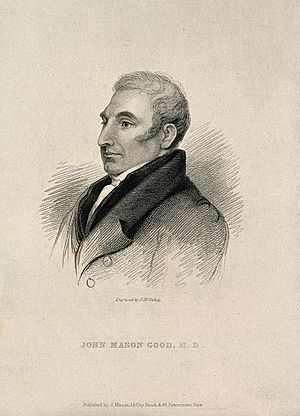John Mason Good facts for kids
John Mason Good (born May 25, 1764 – died January 2, 1827) was a very smart English writer and doctor. He wrote about medicine, religion, and ancient history. John was born in a town called Epping, Essex, in England.
John's father, Peter Good, was a religious leader. His mother, Sarah Good, was the daughter of another religious leader. John Mason Good was named after a famous clergyman and hymn writer, John Mason, who lived a long time ago. John's mother was a descendant of this John Mason.
Contents
Early Life and Learning
John Good went to a school in Romsey that his own father ran. When he was about 15 years old, John started training to become a surgeon and apothecary (a kind of pharmacist and doctor). He trained in a town called Gosport.
In 1783, John moved to London to continue his medical studies. A year later, in 1784, he began working as a surgeon in Sudbury. While there, he met Nathan Drake, who was also a writer and loved Shakespeare's plays.
Moving to London and Writing
In 1793, John Good moved back to London. He started a business with another surgeon and apothecary. However, this partnership did not last long. To earn more money, John began to focus a lot on writing.
He wrote for many magazines like the Analytical Review and the Monthly Magazine. He also wrote many books, mostly about medicine and religion.
Contributions to Medicine
In 1794, John Good joined the British Pharmaceutical Society. He worked hard to improve the job of apothecaries. His book, A History of Medicine (published in 1795), helped a lot with these important changes.
In 1795, the London Medical Society gave him a special gold medal for his work. Later, in 1820, he earned his M.D. (Doctor of Medicine) degree from Marischal College at the University of Aberdeen. John Mason Good passed away in Shepperton, England, on January 2, 1827.
Amazing Language Skills
John Good was not only good at writing, but he was also very skilled with languages. He knew a lot about ancient Greek and Roman literature. He could also speak many European languages. What's more, he knew Persian, Arabic, and Hebrew!
His books showed how much he knew, but sometimes his writing style was a bit serious. He also wrote some poetry, which was pleasant but not very famous. He translated a long poem by Lucretius called The Nature of Things (published between 1805 and 1807). This translation included many detailed notes about words and meanings, along with examples from writers all over the world.
See also
- John Mason Neale, another person with a similar name
 | Stephanie Wilson |
 | Charles Bolden |
 | Ronald McNair |
 | Frederick D. Gregory |


